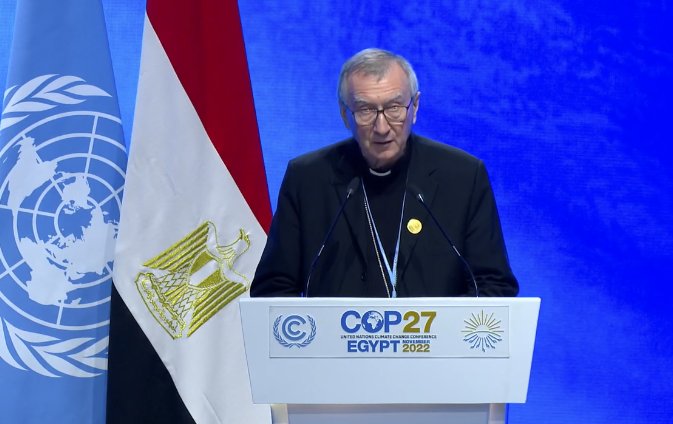SHARM EL-SHEIKH, Egypt (CNS) — Leaders gathered in Egypt for the U.N. climate summit have “a moral obligation” to act seriously and together to safeguard the planet and to offer concrete aid to people suffering the “more frequent and more serious humanitarian impacts caused by climate change,” said Cardinal Pietro Parolin.
The Vatican secretary of state led the Holy See’s official delegation to COP27, the 27th Conference of the Parties to the U.N. Framework Convention on Climate Change, meeting in Sharm el-Sheikh Nov. 6–18.
The cardinal told world leaders Nov. 8 that “the growing phenomenon of migrants being displaced” by climate change is something they must act on because currently “they lack access to international protection” recognizing them as deserving special care.
And, he said, if it is not possible to give them special status as refugees, “it is important to recognize migration as a form of adaptation and to increase the availability and flexibility of pathways for regular migration.”
The 2015 Paris Agreement, which the Vatican has signed on to, set out “four pillars” for immediate action: mitigation, adaptation, finance, and loss and damage payments. Cardinal Parolin told the summit that the four pillars are “interconnected and are a matter of fairness, justice and equity.”
At the same time, he said, “we should also not neglect the non-economic side of loss and damage, like the loss of heritage and cultures. Here we have a lot to learn from Indigenous peoples.”
The time has come for “individual and collective conversion and for concrete decisions that can no longer be postponed,” Cardinal Parolin said.
While the COVID-19 pandemic and wars, including in Ukraine, rightfully concern global leaders because of “their serious ethical, social and economic consequences” and the risk they pose to global security and to food security,” he said, they cannot be allowed to overshadow the work of COP27.
“Climate change will not wait for us,” he said. “Our world is now far too interdependent and cannot permit itself to be structured into unsustainable isolated blocks of countries. This is a time for international and intergenerational solidarity. We need to be responsible, courageous and forward-looking not just for ourselves, but for our children.”
“Our political will,” the cardinal told the leaders, “should be guided by the awareness that either we win together or we lose together.”
PREVIOUS: Ukrainian archbishop tells pope Russia wants to destroy, not negotiate
NEXT: Russian ambassador confirms pope helped facilitate prisoner exchanges




Share this story